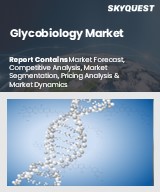
Report ID: SQMIG35H2335
SkyQuest Technology's Glycobiology market size, share and forecast Report is based on the analysis of market data and Industry trends impacting the global Glycobiology Market and the revenue of top companies operating in it. Market Size Data and Statistics are based on the comprehensive research by our Team of Analysts and Industry experts.
Global Glycobiology Market size was valued at USD 2.0 billion in 2023 and is poised to grow from USD 2.3 billion in 2024 to USD 6.98 billion by 2032, growing at a CAGR of 14.9% during the forecast period (2025-2032).
Increased focus on personalized medicine and biopharmaceutical research is among the most critical factors driving the growth of this industry. With increasing demand for targeted drugs, so too increases demand for enhanced understanding of cellular and molecular functions, especially of complex carbohydrate structures. This greater need is leading to more investment in R&D activities within pharmaceutical and biotechnology companies. Furthermore, advances in analytical technologies such as mass spectrometry and high-throughput glycan analysis have enabled research on glycan function, which has led to innovation and product development.
Industry-academic collaborations as well as academic research institutions have also contributed towards broadening knowledge and applications. Government support and facilitating regulatory regimes in the developed world have supported further investigation of the role of glycans in disease diagnosis and therapy. In addition, the increasing application of this science in cancer, infectious diseases, and autoimmune diseases lends evidence to its value in healthcare outcomes. This is complemented by increased application of glycomics in biomarker discovery and vaccine development.
Nonetheless, in spite of these promising trends, the industry has a number of challenges that would impede progress. High structural complexity of glycan and its biological functions are the main limitation in characterization along with functional investigation. Lack of trained personnel and standardized reagent is a further contributor to limitation for research. Moreover, resulting high instrumental and reagent costs for inputs required to analyze glycan can be limiting to accessing smaller research centers and firms. These collectively lead to reduced adoption and commercialization of glycan utilization, particularly in the developing economies.
How is worldwide glycomics research being fueled by government support?
Governments across the globe are significantly boosting investments in glycomics research. For instance, the U.S. National Institutes of Health (NIH) has initiated programs like the Glycoscience Program and the Common Fund Glycoscience Initiative to support glycomics research. Similarly, the European Union's Horizon 2020 program has funded several glycomics projects, which speaks volumes about the importance of this field of research in cracking diseases and developing new therapeutics.
REQUEST FOR SAMPLE
Global Glycobiology Market size was valued at USD 2.0 billion in 2023 and is poised to grow from USD 2.3 billion in 2024 to USD 6.98 billion by 2032, growing at a CAGR of 14.9% during the forecast period (2025-2032).
The glycobiology market is characterized by strong competition among the leading companies such as Thermo Fisher Scientific, Agilent Technologies, Merck KGaA, Bruker Corporation, and New England Biolabs. They are all spending a lot of money on research and development to enhance their product portfolios and maintain top position in the market. For instance, Merck KGaA announced investment of over USD 320 million in a new Life Science Research Center in Germany, Darmstadt, to focus on mRNA and antibody production applications, the very essence of glycobiology research. Strategic partnerships and mergers and acquisitions also play important roles in determining market trends. Bruker Corporation's acquisition of IonSense in 2022 was to boost its mass spectrometry capabilities, a major application domain for glycan analysis. Similarly, GlycoNet's collaboration with BridgeBio Pharma in 2021 was to develop drugs for genetic diseases based on glycobiology research. 'Thermo Fisher Scientific (US)', 'New England Biolabs (US)', 'Merck KGaA (Germany)', 'Promega Corporation (US)', 'Waters Corporation (US)', 'Takara Bio Inc, (Japan)', 'Bio-Techne (US)', 'Agilent Technologies (US)', 'Sumitomo Bakelite Co. Ltd. (Japan)', 'Bruker Corporation (US)', 'Shimadzu Corporation (Japan)', 'Danaher Corporation (US)', 'AMS Bio (UK)', 'Ludger Ltd (UK)', 'Z Biotech, LLC (US)', 'Chemily Glycoscience (US)', 'CD BioGlyco (US)', 'GlycoDiag (France)', 'Kode Biotech Limited (New Zealand)', 'Glyxera GmBH (Germany)'
Governments across the globe are spending a lot on glycomics research to enhance health. The government of Australia, for instance, used over USD 10 billion in scientific research innovation between 2017 and 2018, while Ireland used USD 5.6 billion in 2015 on enhancing research activities, with the aim of growing scientific research personnel from 25,000 to 40,000. The investments are driving the growth of the glycobiology market through enhancement and enhanced research capacity.
Why is North America a Leader in Glycobiology?
Want to customize this report? This report can be personalized according to your needs. Our analysts and industry experts will work directly with you to understand your requirements and provide you with customized data in a short amount of time. We offer $1000 worth of FREE customization at the time of purchase.
Feedback From Our Clients

Report ID: SQMIG35H2335
sales@skyquestt.com
USA +1 351-333-4748